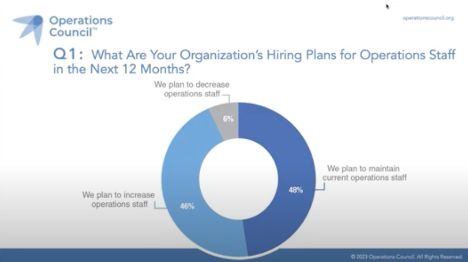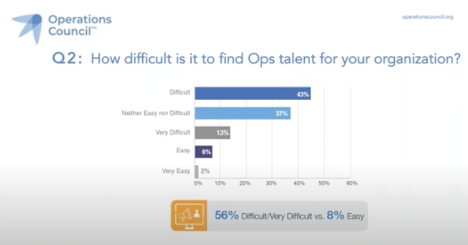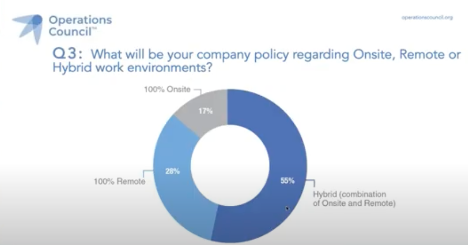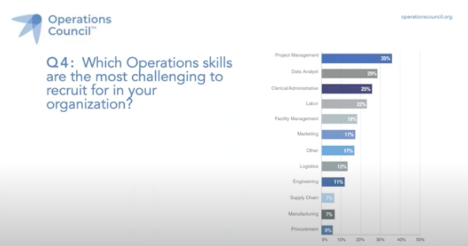Operations Council recently held a roundtable panel discussion on the 2023 Operations Talent Study Results.
The objective of the study was to identify how COOs and operations executives are managing operations talent along with such challenges as talent and skills shortages, hybrid and remote work environments and rapidly changing macroeconomic environments and more. A national survey was conducted from June to August of 2023 with more than 200 respondents participating across North America.
Subject matter experts for this webinar included Mel Heckman, Billy Lawder and Matt Barnes.
Mel Heckman is the serial COO and CIO, with 30-years experience on the client and consulting side with Ernst and Young, American Outdoor brands and many. Mel says many others. Mel earned an MBA from the University of Chicago and a Bachelor of Science Operations Management and Information Systems from Northern Illinois University, my alma mater, and he is CPIM certified with APICS.
Billy Lawder is COO at Peak Technologies, an IT and mobility solutions provider. Prior roles included Home Depot, Simmons Bedding, Anheuser-Busch, very interesting Billy. And he earned a Bachelor of Industrial and Systems Engineering from Georgia Tech and an MBA from Kennesaw State with PMP and Six Sigma Black Belt certifications.
Matt Barnes is managing partner at Workfast Studios an Operations consulting firm. He began his career as a commissioned officer in the US Navy and was VP operations at Peak Technologies. Matt worked in energy supply chain and many other industries. He earned a BS and industrial engineering from Georgia Tech and MBA from University of North Carolina and is a professional engineer and active, and a certified project management professional and a Lean Six Sigma Green Belt.
Following are key takeaways to this discussion. If you are interested in learning more, view the full webinar archive video here.
What Are Your Organization’s Hiring Plans for Operations Staff in the Next 12 Months?

Neil: What are your organization’s hiring plans? Only 6% decreasing, 48% maintain, 46% increasing. Panelists, your perspectives.
Billy: The way I look at it from my role is that operations is constantly changing. So being from a barcoding type of company, we go back to the days of manual inventory to barcodes, to RFID, now to AI and vision. In our case, we’re really looking to maintain the current staff that doesn’t necessarily, in our case, mean to maintain the same current staff. As we see other companies decreasing their staff or groups getting caught up in a layoff, we’re very quick to look for top rates and look for opportunities to get the right skillset to go forward. Maybe not the right skillset from 10 years ago.
Matt: I think there’s some complexity being added to operations teams all the time. Technology’s changing dramatically very quickly. And with that, I think that you hope to see some labor reduction in certain areas, but a lot of times you often see an increase to try to deal with new technology and new requirements. So that may be a driver as well.
Mel: We’re finding this weird dichotomy where we’re trying a massive digital transformation in operations and trying to make the business more efficient. And what we’re finding is that to get what we want; we have to purchase a system which has a higher cost than you would think would be relative for that business if you think of a relative percentage of revenues. While we’re not looking to increase staff, what we are doing is building an anticipation of increasing staff next year or the following year. So, it’s really this build… What’s that? Field of dreams, motion of build it and they will come. We’re building systems right now with the intention of adding folks later.
How Difficult is it to Find Ops Talent for your Organization?

Neil: We’ve got 43% stating difficult, another 13% very difficult. That’s a total of 56% versus 6% and 2% saying easy and very easy for a total of 8%. Surprisingly 37% neutral. What do you think about these neutral respondents? Are they maintaining levels or maybe they just don’t hire?
Matt: I wonder if it’s just that it’s always been hard for them, so it’s just still hard. I haven’t talked to anybody that just has that idea that it’s basically neither easier nor difficult. Everybody I’ve talked to said it’s very difficult right now to find talent or the type of talent they want. So, I really don’t know why it would be neither easier nor difficult. All I can offer is that to the person that I’ve talked to, it’s difficult right now to find the people that you want with the skills that you want and then the work ethic and other things that you want for the business.
Mel: I can’t speak to the neutral, but I will tell you that one of the difficulties that we’ve been facing is this entitlement of the work from home environment has created, right? And so especially when you’re talking about operations as much as you want this hybrid or this work from home notion, at some point COVID introduced that as a convenience, but it was to the detriment of the operations in many cases. What we’re finding is it’s hard to get people to want to come on site and it’s really narrowing the field of candidates that we can to solve basic. When you get into just operations like pick, pack, ship operations or manufacturing operations, it’s been hard to do that.
Billy: After COVID, everybody locked down and said, “Hey, I’ve still got a job. This is great. I’m actually getting paid.” The great migration started, so everybody was like, “Hey, I didn’t really like this job, I’m going to go somewhere else.” And we saw it went back the other way with a lot of candidates really overlooking and trying to significantly either change industries or up their payroll. But where we really struggle is that we used to be able to call in our warehouses, “Hey, I need a temp agency. Can you essentially materialize three solid people tomorrow morning?” And we’d have five, 10 agencies fighting to put those three people in.
And now it’s almost the flip side of, “Hey, we’re even upping the rates and we still can’t get good folks that really want to work on the dock to show up.” I think some of that, if you look at some of the offers that are out there, fully remote offers from very large companies, there are full remote positions that don’t require you to drive an hour to come in and work on a dock. And so that’s really created… At least in my 20 years, I haven’t seen that before, of used to be able to really get a workforce to show up. And that’s really been the most. The biggest struggle for us is to get those folks on the dock to really come to work every day.
What will be Your Company Policy Regarding Onsite, Remote or Hybrid Work Environments?

Neil: Such low Onsite compared to some national surveys at 17%, along with 55% Hybrid, and 28%. I’m thinking that this might be industry specific. Hybrid and remote is more of a possibility in the service categories, but manufacturing, maybe retail and some of these other verticals require people to be on site working with customers.
Billy: One thing to add to connect the couple questions, what we’ve taken the opportunities since folks are in our service departments and our call centers and our technical operations type roles or even PMs that can travel to a project when they need to. We’ve taken the opportunity to really expand the footprint where we’re looking for talent. And I think we’ve got folks physically in six time zones now, and we’ve also even opened offshore teams so that we’ve followed the sun all the way around. But it’s really given us an opportunity to connect all those pieces. We’re used to be able to go zip code by zip code and essentially search for folks within a 10-mile radius and limit the pool.
Which Operations Skills are the Most Challenging to Recruit for in Your Organization?

Neil: Project management ranked highest at 35% closely followed by data analysts at 29% and clerical administrative at 25%. A second tier has labor at 22%, followed by facility management at 19 and marketing at 17%. Surprisingly, many traditional operation skills are ranked lower, including logistics at 12%, supply chain and manufacturing at 7% and procurement at six. Also, a surprise was engineering at 11%.
Billy: From a data analyst job, I think there’s a lot more competition now out there, and a lot of opportunity if you’re using ChatGPT or something like that and all the AI tools to either drastically speed up that job or it just makes those folks that are good at that even that much harder to go get. And then dock labor has probably been our biggest challenge to find good folks that want to have that as a career path.
Matt: I wonder if some of the more traditional fields like logistics, engineering, supply chain, if that’s being outsourced more so there’s less demand to hire for that. I know I’ve seen that in different industries that I support. I was talking to a friend this weekend who just retired as the leader of a PMO of a healthcare company in the northeast. And he said that he verified this because I was talking about the survey and seeing the results. And it’s like, “Is this what you’re seeing?” He’s like, “Yeah, absolutely. Pre-pandemic, we could find project managers pretty easily, but post pandemic, it’s been very difficult.” And I think some of that may have to do with workforce turnover, people leaving the workforce retiring, et cetera. And maybe just not having the seasoned folks that you want in great quantities to be able to fill those roles. You got to battle for that seasoned skillset. I think that this, what I’m hearing from people does reflect this.
Mel: The angle I would take with this is slightly different. For me it’s the business analyst that is the most challenging. But what we’re finding is a shift in what we’re really worried about with talent is the business continuity angle. The notion that people stay at jobs more than a couple years was challenged before COVID and now it’s gone, right? The organization I work with now historically had people there for 15, 20 years. You know what that is? That’s a unicorn right now. As we are trying to hire talent or get these right people, you have to think of another angle of our people, process and technology (PPT), simple enough to allow for highly transient work folks at all levels from project management all the way to the leadership team? I think that’s the different challenge that speaks to this as well.
To view the complete webcast panel discussion, click here.
To download/read/print the State of Operations Talent Study Results Report, click here.



0 Comments